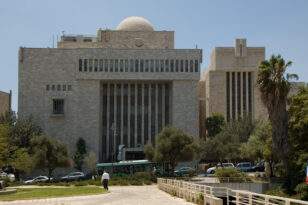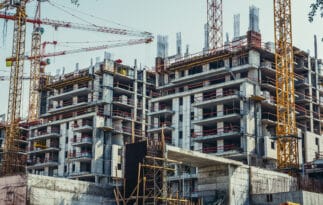According to data from the Central Bureau of Statistics (CBS), the average salary in the “Real Estate Activities” sector—which includes brokers and real estate agents in Israel—stood at NIS 19,255 this past March, a record high driven in part by a seasonal increase typical of the month. In the construction sector, the average salary was NIS 13,538, reflecting a 6.1% rise from the previous month.
By Doron Breitman, Nadlan Center
According to new data from Israel’s Central Bureau of Statistics (CBS) published on Wednesday, the average salary in the “Real Estate Activities” sector—which includes brokers and real estate agents in Israel—reached NIS 19,255 this past March,. This marks an all-time high, driven in part by a seasonal spike typical of March. For comparison, the average salary in this sector in March of last year stood at NIS 18,577, while the annual average was just NIS 15,593. Although March generally sees an uptick, the average salary in March 2025 rose 3.7% compared to the same month last year, and an impressive 18.9% compared to February.
The seasonal trend in March also impacted the construction sector, where the average salary stood at NIS 13,538—a milder increase of 6.1% over the previous month and 4% compared to March last year. This sector includes professions related to building construction and infrastructure work, such as road construction and renovations. However, the rate of increase in this field was lower than that of the overall job market, where average salaries rose 6.5% month-over-month and 4.5% year-over-year.
As of March, the number of positions held by Israeli workers in the “Real Estate Activities” sector reached 34,800—an 8.3% rise from 32,100 the year before. In the construction sector, the number of jobs climbed to 216,100, compared to 209,200 a year earlier—an increase of 3.3%.
The national average salary in March was NIS 14,672. In the high-tech sector, the average salary stood at NIS 36,731, up 2.3% year-over-year. This figure is 2.5 times higher than the national average, 1.9 times higher than the average in the real estate activity sector, and 2.7 times higher than in the construction sector.
Israel’s economy is divided into sectors based on CBS classifications. The two main sectors in the real estate world are “Real Estate Activities” and “Construction.” The former includes several subfields: “Real Estate Activities with Own or Leased Property” refers to buying, selling, renting, and managing properties such as apartment buildings, residential homes, commercial buildings, and land. This sub-sector does not include the development of construction projects for sale, subdivision and improvement of land, hotel operations, vacation rentals, camping sites, or worker/student dormitories.
A second sub-sector is “Real Estate Activities on a Fee or Contract Basis,” which includes brokers and real estate agents in Israel who handle sales, rentals, and purchases on commission or contract, as well as property management under similar arrangements. It does not include appraisal services, legal services, or integrated building maintenance support services. A third sub-sector focuses exclusively on real estate appraisal services.
The second major sector in real estate is the construction industry, which encompasses a wide range of subfields. These include “General and Specialized Construction Work,” such as building structures and civil engineering projects. This includes the construction of new buildings, extensions to existing ones, renovations, on-site assembly of prefabricated structures, and the construction of temporary buildings.
Another key sub-sector is “General Construction,” covering residential, office, commercial, public, and agricultural buildings, along with civil engineering work, like paving roads, building bridges, excavating tunnels, installing railways, construction air- and seaports, and water-related projects. It also includes irrigation and sewage systems, industrial facilities, pipeline and electrical infrastructure (both above and below ground), sports facilities, and renovation work for civil engineering structures.

Nadlan Center is Israel’s leading real estate news and knowledge platform in Hebrew, created for industry professionals. Founded by experts in the field, it delivers in-depth, up-to-date coverage on urban renewal, planning and construction, taxation, and housing policy — tailored to the needs of developers, investors, planners, and financiers. In addition to its widely read news content, Nadlan Center hosts major industry events, professional conferences, and training programs that support the growth and development of the Israeli real estate sector.
Learn more: https://www.nadlancenter.co.il







